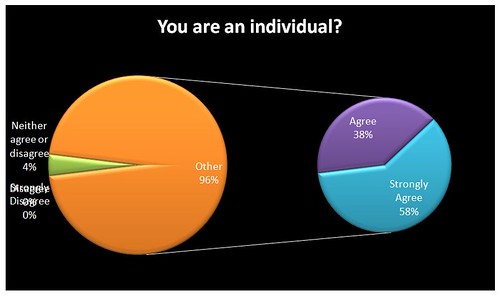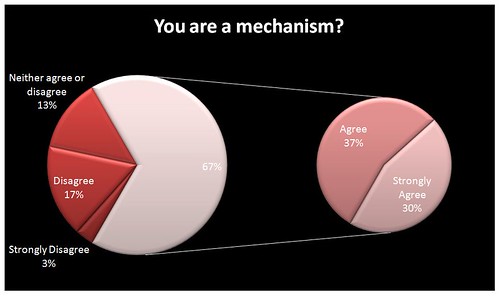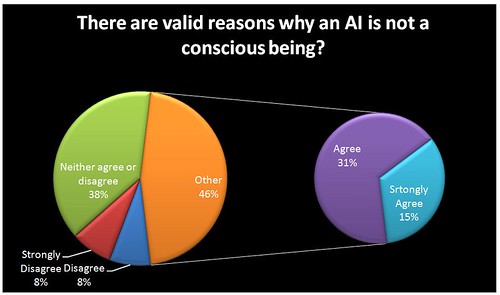Just to recap I have included the table of results from the 26 people that took part in the questionnaire below:

While you have already seen the breakdown for this question in the previous post. I need to show this again to include with these results too. So to recap, in Fig 1 (below) I have compiled a split pie chart breakdown. I have added the agree 38% and strongly agree 58% results together, totalling 96%. It appears that the majority of people think they are an individual, though 20% more, strongly agree than others.
Fig 1:

In fig 2 (below) I have added the agree and strongly agree results together, totalling 85%. While 15% neither agree or disagree, so the majority of people agree that they are a collection of natural generative elements.
Fig 2:

The combined results of Fig 3 (below) are 67% think they are a mechanism. 17% disagree, while 13% neither agree or disagree. It appears that most people think they are a mechanism.
Fig 3:

In Fig 4 (below) 12% thought that questions 1,2 & 3 in the questionnaire were contradictions. While 38% disagree and 15% strongly disagree totalling 53%. While 35% neither agree or disagree. It appears most people think that the first 3 questions are not contradictions.
Fig 4:

I found these results interesting to see how the figures gradually fell from questions 1, 2 & 3:
- Are you an individual? 96% of people agree on this.
- Are you a collection of natural generative elements? 85% agree on this.
- Are you a mechanism? 67% agree on this.
- Do you feel that questions 1, 2, & 3 are contradictions? 53 % think that they were not contradictions.
It appears that most people consider themselves an individual, a collection of natural generative elements, a mechanism, and that these are not contradictions.
I have left questions 7 & 10 of the questionnaire to breakdown last as I noticed that the main differences between a human and an AI are actually more noticeable in the results from these questions.
First see Fig 5 (below). Here you can see that 35% disagree and 15% strongly disagree that an AI is a collection of natural generative elements, these figures totalling 50%. While 46% neither agree or disagree and 4% strongly agree.
Fig 5:

These results are also very similar to the results from the question - There are valid reasons why an AI is not a conscious being? In the breakdown in fig 6 (below) 31% agree, 15% strongly agree totalling 46%. While 38% neither agree or disagree, 8% strongly agree and 8% agree. These results are very similar to Fig 5, (above) and I am wondering if there could be a correlation?
Fig 6:

Looking at these results there may be a connection why people are so indecisive about AI's in the other questions, shown in the breakdowns of research in part 1. Since 50% do not think an AI is a collection of natural generative elements, and 46% think that there are valid reasons why an AI is not a conscious being. Could question 7, (fig 5) actually be an important link to why people are so indecisive regarding the other questions about AI's. So if people thought AI's were a collection of natural generative elements, would this make a difference to whether an AI would be considered a conscious being? I would like to know the reasons behind this, along with why 46% think that there are valid reasons why an AI is not a conscious being?
While it may appear that there could be a correlation, this may not equal the causation. However I found it very interesting doing these breakdowns to compare the results, which is something that I would be interested in researching further within my artwork.

No comments:
Post a Comment